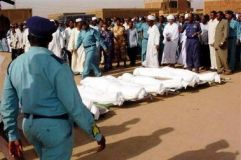Sudan refugee mourns dead son after police clashes
By Opheera McDoom
SOBA ARADI, Sudan, May 19 (Reuters) – Zam Zam Umar sent her eldest son to buy food in the market, only to learn shortly afterwards that police had shot him dead in the Soba Aradi refugee camp outside the Sudanese capital Khartoum.

|
|
The bodies of police officers await burial in Khartoum, Sudan, Thursday, May 19, 2005. Fourteen policemen and three civilians were killed when citizens resisted relocation attempts and attacked a police station in a south Khartoum neighborhood, a government official said Wednesday. (AP). |
He was one of at least 17 people who died in violence on Wednesday which erupted when police tried to move displaced people to land further outside the capital and they refused. Both camp residents and police officers were among the victims.
A day after the killings, local people and the police gave conflicting versions of what happened and different death tolls, blaming each other for the bloodshed.
Umar, 27, has six other children to feed. She comes from the war-torn region of Darfur in Sudan, but has lived in the slum about 30 km (19 miles) outside Khartoum for more than a decade.
“He helped support me – my other children are so young,” she said of her son Mudathir Abdallah Zakaria, 14. Tears rolled down her cheeks as her other children clung to her legs and clothing.
Slums and camps surrounding the sprawling capital are home to more than 2 million people, mostly southerners displaced by two decades of civil war but also from Darfur in the west.
The residents of Soba Aradi were looting the burnt shell of a police station in the camp on Thursday, making off with the zinc roofing and hammering away at anything nailed down to the walls or the floor.
They pointed out bullet holes in the walls of the blackened and deserted station, surrounded by four burnt vehicles.
“They (police) were firing randomly,” said Abdallah Zakaria Hamid, a relative of Mudathir. “When they killed the young boy then everyone became so angry they began attacking the police back.”
The governor of Khartoum, Abdel Halim al-Mutafi, said the police had been attacked but denied that his men opened fire.
He said 14 police officers were killed, by people using knives and stones, and that three civilians had died.
DIFFERENT VERSIONS
But people living in the camp said there were 17 dead civilians and more than 60 injured, all from bullet wounds.
The residents confirmed that angry crowds, mostly from the troubled south and Darfur, had killed 14 police and injured about a dozen more. Both sides say they suffered the first victims and had only been defending themselves.
Journalists were not allowed into the hospital to see the wounded or dead and the residents could not provide names for all those they said had been killed.
Other journalists were turned away from Soba Aradi by police checkpoints surrounding the area. But no police or security forces were present in the camp itself.
Ibrahim Ahmed Ibrahim said police had surrounded the camp at dawn on Wednesday preventing anyone from leaving. “Then they started to take people’s things from their homes and load them up saying they were moving us to another area,” he said.
But the residents refused and that’s when police opened fire, he said.
The slum areas around Khartoum have little or no running water or electricity and aid agencies have found it difficult to improve the situation there.
Khartoum authorities say they want to demolish the slums to relocate residents to permanent, planned housing plots.
The government says it had a signed agreement from the local people’s committee, which is supposed to represent the camp residents, agreeing to move a number of residents.
But the people said the committee did not represent them.
“They were going to move us to somewhere in the middle of nowhere where there’s nothing,” said Ibrahim.
Adam Ahmed Mohamed said the committee was on the side of the government and had stayed in power since 1996. “There were no elections to nominate new representatives since then,” he said. “They don’t represent us and we don’t agree with what they say.”
